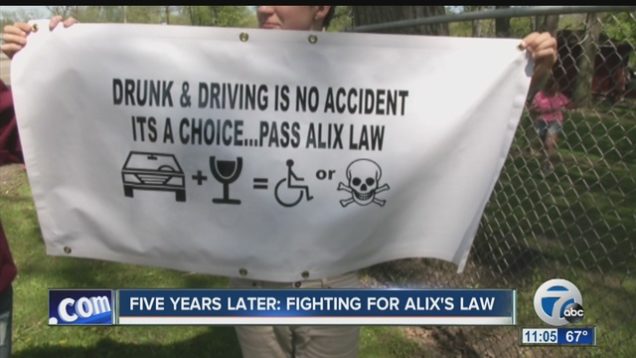Alix’s Law: Is the 7th Time the Charm?
On the night of July 8, 2011 18 year-old Alexandria “Alix” Rice died on the side of the road in a town just outside of Buffalo, New York. Alix was riding her longboard home from work around 11:20 pm when a drunk driver hit her and sent her flying 150 ft. from the point of impact, breaking both of her legs, some ribs, and lacerating her cerebellum. The driver, Dr. James Corasanti, a 55 year-old gastroenterologist sped away from the scene leaving Alix to die. Alix did not die alone though. Another motorist and his wife stopped to help Alix after seeing a car speeding towards Alix and then hearing an “almighty bang,” a sound the witness described as “ungodly.” Other residents of the usually quiet street reported hearing a “loud thump,” a “horrific noise,” and a “jarring sound” and many came out to help Alix. Dr. Corasanti however, did not stop. He drove home, cleaned Alix’s blood and flesh from the front of his $90,000 BMW, deleted some text messages, called an attorney, and 91 minutes later, turned himself into police.
At the police station Corasanti refused to submit to a blood test to determine his blood-alcohol level. Five hours later law enforcement officers were able to get a court order for Corasanti’s blood, which registered a .10 blood-alcohol content, .02 above the legal limit. Prosecutors charged Corasanti with second-degree manslaughter, second-degree vehicular manslaughter, leaving the scene of an incident without reporting, resulting death, tampering with physical evidence, and misdemeanor driving while intoxicated. During the trial experts testified that Corasanti’s BAC was likely between .14 and .21 when he hit Alix Rice. Evidence showed Corasanti had been texting and speeding when he hit Alix, though there was disagreement as to whether Corasanti crossed over into the bicycle lane where Alix was riding or if she had crossed into the road when she was hit. Yet, despite the significant weight of the evidence, Corasanti was acquitted of all charges except the misdemeanor DWI.
Dr. James Corasanti was drunk, texting, and speeding when he hit Alix Rice and left her for dead on the side of the road. How was he able to avoid all felony charges, including leaving the scene of an incident without reporting? The answer; a loophole in the law that only requires a driver to stop if they know or have reason to know that a person has been injured, or that damage has been done to property as a result of a motor vehicle accident. The current law gives drivers an incentive to leave the scene of an accident because in order to convict, prosecutors must prove that anyone in the driver’s position must have known that they hit a person. Corasanti and his defense team were able to convince the jury that there was reasonable doubt as to whether Corasanti knew that he hit a person. Corasanti claimed that his BMW was designed to cancel out noise and therefore he did not hear the impact of his car hitting Alix’s body. Dr. Corasanti was sentenced to one year in jail despite killing Alix Rice.
 Lawmakers and the public were outraged. Looking for a way to close the loophole that allowed Corasanti to receive such a minimal sentence, New York State Senator Patrick Gallivan introduced Alix’s Law, Senate Bill 7577-A in 2012. Alix’s Law is designed to prevent drunk drivers from hitting something or someone, leaving the scene, and then being able to claim that they did not know that any injury or property damage occurred. The bill holds drunk drivers responsible for leaving the scene of an accident. Alix’s Law, adds the following language to the current statute:
Lawmakers and the public were outraged. Looking for a way to close the loophole that allowed Corasanti to receive such a minimal sentence, New York State Senator Patrick Gallivan introduced Alix’s Law, Senate Bill 7577-A in 2012. Alix’s Law is designed to prevent drunk drivers from hitting something or someone, leaving the scene, and then being able to claim that they did not know that any injury or property damage occurred. The bill holds drunk drivers responsible for leaving the scene of an accident. Alix’s Law, adds the following language to the current statute:
“A person operating a motor vehicle in violation of section eleven hundred ninety-two of this chapter that came into contact with a person, real property, or personal property, that resulted in damage to real property or to the personal property, not including animals of another, shall be presumed to have known or have cause to know of such contact and of such damage, unless such person shows that they would not have known or had cause to know of such contact and of such injury regardless of intoxication or impairment by the use of alcohol or a drug.”
The new language creates a rebuttable presumption that an intoxicated driver who is involved in an accident knows that they have caused damage or injury and therefore they must stop and report the accident to police. The current law is the opposite. In order to convict someone for leaving the scene of a fatal accident, the prosecution has the burden of proving that the driver knew or should have known that they hit a person. This law makes it easier to prosecute people for leaving the scene of an accident they caused while driving drunk. Alix’s Law passed in the Senate on June 19, 2012 and was sent to the Assembly where it died in the Transportation Committee.
Alix’s law was reintroduced in 2013, 2014, 2015, and 2016. Each year Alix’s Law has received unanimous, or near unanimous support from the Senate. In 2016, Alix’s Law passed 58-0 in the Senate before it stalled in the Assembly. In 2017 Sen. Gallivan introduced Alix’s Law for the 6th time as S. 3393-A. The same bill was introduced in the Assembly as A.1944 by Assemblywoman Crystal Peoples-Stokes. Alix’s Law passed 61-0 in the Senate in 2017, but again died in Assembly. Alix’s law was returned to the Senate, and as of February 6, 2018, it was back in the Senate Transportation Committee.
It is not clear why Alix’s Law has yet to move out of committee in the Assembly after passing unanimously on six different occasions in the Senate. Assemblywoman Peoples-Stokes told reporters that counsel for the committee has advised that Alix’s Law is unnecessary and that the law already covers what Alix’s Law is trying to change. However, a former acting Erie County District Attorney points out that the law would change the incentives for people to leave the scene of an accident, and would help close the loophole that allowed Dr. Corasanti to avoid felony charges. Additionally, there have been a number of high profile hit-and-runs in the past few years, and so it may be time for the legislature to take action and to address the problem. Whether or not Alix’s Law will ever pass the assembly is yet to be seen, but Sen. Gallivan and the Rice family continue to advocate for Alix’s Law and are committed to keeping Alix’s memory alive.
 Meghan Hayes anticipates graduating from Boston University School of Law in May 2019.
Meghan Hayes anticipates graduating from Boston University School of Law in May 2019.



